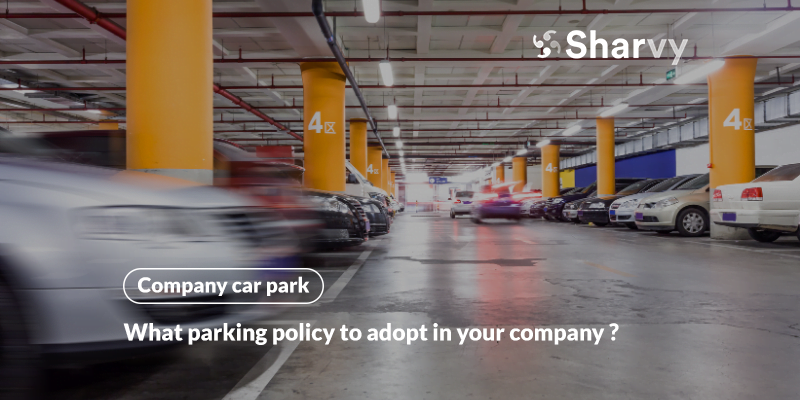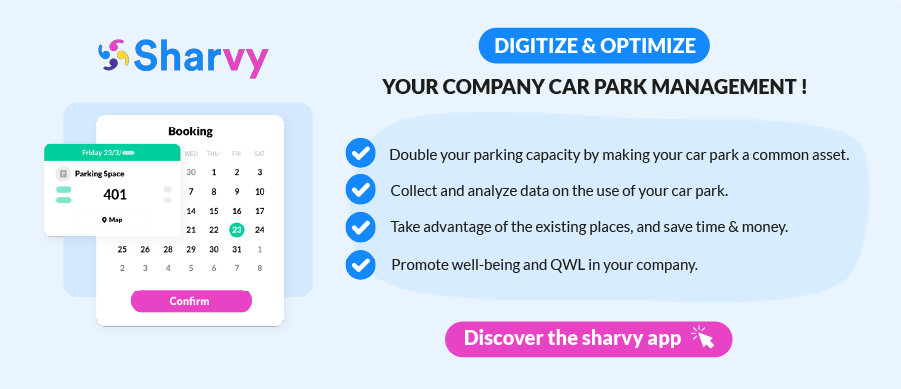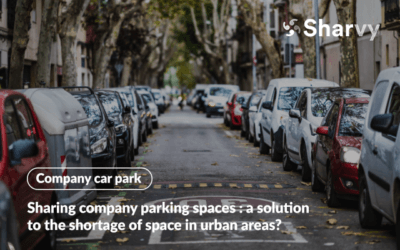Although often seen simply as a place to park vehicles, car parks play a crucial role in a company’s organizational policy. Proper parking management, with its practical and symbolic implications, not only helps make employees’ daily lives more fluid but also reflects the company’s vision and values in terms of mobility, accessibility, and well-being at work.
That’s why it’s essential to define a parking policy. This charter includes various rules to organize the company car park. It aims to regulate parking within the car park and keep traffic flowing smoothly.
In this article, we take an in-depth look at the impact and issues inherent in the parking policy for a company car park, revealing the nuances that are often overlooked!
1. Why implement a parking policy?
At first sight, it may seem surprising that a “simple” optimization of your parking policy could bring about a (lasting) change in mobility practices within your company. And yet, by applying specific management rules, promoting fairness, and adopting various actions, you can achieve a great deal. And there are many benefits for both your employees and your company.
- You optimize the management of your car park. Today’s hybrid organizations, flexible working, and new ways of working mean that employees are more mobile than ever, adding to management’s complexity. Nowadays, employees regularly rotate from one site to another, making it difficult for security managers or reception staff to keep track of everyone coming and going. Multi-site management can become a real headache! Companies must simplify multi-site management by deploying a reliable, flexible, easy-to-install policy.
- Unify access management for all your car parks. Many companies wrongly imagine having no choice but to opt for a separate access control solution for each building. However, the cost of implementation, maintenance, and management (both for the company and its employees) is restrictive! But it is now possible to unify access management for all your company’s sites by opting for a centralized SaaS solution like Sharvy. This solution is compatible with numerous access control systems (RFID badges & cards, IoT modules, cameras, etc.). Over and above this advantage, these solutions harmonize practices and make it easier to manage multi-site car parks. As a result, for the team managing it, the task is more straightforward daily, and recurring parking problems are eliminated.
- You are improving your company’s Quality of Life and Working Conditions (QLWC). In addition to enhancing QWL through a fair parking policy, you are also improving your CSR policy. Moreover, by integrating digital technologies into your car park, you can encourage soft mobility (electric vehicles, bicycles, car sharing, etc). For example, you could reserve a parking space for employees who carpool daily.
- Make your company car park more profitable. With good parking management and good parking management strategies, your car park will be fuller. As a result, you’ll optimize your occupancy rate. There will also be fewer vacant spaces daily (since, on average, 30% of spaces still need to be used in a company with no defined policy). Moreover, the company can choose to rent out specific spaces if the car park is incomplete and thus covers part of its costs.
However, before investing in additional parking spaces, use our white paper to optimize your company car park.
2. How to create the policy?
The first step in creating a parking policy is to analyze the company’s current situation, context, and capacities. A company with a 100-space car park will make different choices than one with 20 spaces. The same applies to a company with a ratio of one space for every 4 people and another with one space for every 8 people.
What’s more, it’s essential to highlight the positive and negative points of your current management to maintain and/or improve it.
Finally, the company should also analyze the mobility habits of its employees. This way, it will know who to allocate spaces to and how to equip the car park accordingly (electric terminals, two-wheeler spaces, etc.). There are many questions: Who comes by public transport or by their means? How many people have an electric or hybrid vehicle? What is the average journey time between home and work? Who carpools? And so on.
3. What tools can be used to implement it easily?
Implementing this type of policy can be done either by your own means or with the help of a dedicated solution.
Implementation via an internal team can be very time-consuming. Moreover, it does not allow all actions to be carried out in a simple manner : reservation and allocation of a place, occupancy statistics, etc.
In order to save time on a daily basis, it is more advantageous to opt for a dedicated digital solution… such as Sharvy! Thanks to a web and mobile application, employees reserve a space or release their own if they are holders when they are absent. The allocation algorithm will automatically distribute the available spaces according to the priority rules defined by the administrator (either via our mobility questionnaire or by rules that he or she has already determined beforehand).
Opting for this type of solution allows employees to adopt the policy more quickly. They feel supported. In addition, parking is shared equally among all. It is no longer reserved for a small part of the company (managers, senior management, etc.).
In conclusion
Decisions about parking policy should not be taken lightly, as they have profound implications for employees’ working lives and the company’s overall perception. By adopting a considered and strategic approach, organizations can not only solve practical space management problems but also embody their values and demonstrate their commitment to comfort, flexibility, and respect for work-life balance.
So, far from being a mere logistical formality, corporate parking is essential in creating a working environment that fosters productivity, employee satisfaction, and a positive corporate image. By incorporating these considerations into their parking policy, companies can make a real difference in the day-to-day experience of their employees, helping to forge a balanced, efficient, and forward-looking working environment.
Have a question ? Check out the FAQ !
What are the benefits of implementing a parking policy in a company?
Implementing a parking policy offers several benefits, including optimised parking management, simplified access through centralised solutions like Sharvy, and improved quality of work life (QWL). Additionally, such a policy can promote sustainable mobility by reserving spaces for electric vehicles and carpoolers. Finally, it helps reduce costs by optimising the occupancy rate of parking spaces and renting out unused spaces.
How can a company create and implement an effective parking policy?
To create an effective parking policy, a company should first analyse the current parking situation and the mobility needs of employees through surveys. Next, it should establish clear rules for allocating spaces, taking into account priorities such as electric vehicles or carpoolers. Using digital tools like Sharvy facilitates the management of reservations and space allocations, making the process simpler and fairer for everyone.
How can an SME integrate a parking policy tailored to its specific needs?
To integrate a parking policy that fits its specific needs, an SME should first analyze its parking capacity and the specific needs of its drivers, such as the number of spaces, accessibility for those with reduced mobility, and work schedules. The use of digital and connected solutions, such as reservation management systems, can simplify management, improve fairness, and optimize the use of parking spaces. Additionally, digital transformation can help centralize information and automate processes, thereby reducing manual tasks.
Want to learn more? Check out our latest articles!
How can you reduce the number of no-shows when booking parking spaces?
What are no-shows in company car park reservations? What are the disadvantages? How can they be reduced? Focus.
Sharing company parking spaces : a solution to the shortage of space in urban areas?
What is the sharing company parking spaces? Is it a solution to the shortage of parking spaces in urban areas? Focus.
Company car parks : an unsuspected lever for your CSR strategy.
How can your company car park support your CSR strategy in environmental, economic and social terms? Here’s our advice!
Subscribe to our newsletter!
Resources
Contact us
+44 117 463 6990






